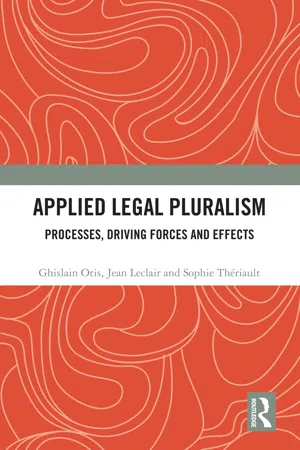
Applied Legal Pluralism
Processes, Driving Forces and Effects
- 296 pages
- English
- ePUB (mobile friendly)
- Available on iOS & Android
Applied Legal Pluralism
Processes, Driving Forces and Effects
About this book
This book offers a comparative study of the management of legal pluralism.
The authors describe and analyse the way state and non-state legal systems acknowledge legal pluralism – defined as the coexistence of a state and non-state legal systems in the same space in respect of the same subject matter for the same population - and determine its consequences for their own purposes. The book sheds light on the management processes deployed by legal systems in Africa, Canada, Central Europe and the South Pacific, the multitudinous factors circumscribing the action of systems and individuals with respect to legal pluralism, and the effects of management strategies and processes on systems as well as on individuals. The book offers fresh practical and analytical insight on applied legal pluralism, a fast-growing field of scholarship and professional practice. Drawing from a wealth of original empirical data collected in several countries by a multilingual and multidisciplinary team, it provides a thorough account of the intricate patterns of state and non-state practices with respect to legal pluralism.
As the book's non-prescriptive approach helps to uncover and evaluate several biases or assumptions on the part of policy makers, scholars and development agencies regarding the nature and the consequences of legal pluralism, it will appeal to a wide range of scholars and practitioners in law, development studies, political science and social sciences.
Frequently asked questions
- Essential is ideal for learners and professionals who enjoy exploring a wide range of subjects. Access the Essential Library with 800,000+ trusted titles and best-sellers across business, personal growth, and the humanities. Includes unlimited reading time and Standard Read Aloud voice.
- Complete: Perfect for advanced learners and researchers needing full, unrestricted access. Unlock 1.4M+ books across hundreds of subjects, including academic and specialized titles. The Complete Plan also includes advanced features like Premium Read Aloud and Research Assistant.
Please note we cannot support devices running on iOS 13 and Android 7 or earlier. Learn more about using the app.
Information
Chapter 1 Processes of legal pluralism management
Introduction
1 Management through the articulation of systems
Table of contents
- Cover
- Half Title
- Title
- Copyright
- Dedication
- Contents
- Acknowledgements
- The management of legal pluralism: processes, parameters for action, and effects
- 1 Processes of legal pluralism management
- 2 Parameters of action in a context of legal pluralism
- 3 The effects of legal pluralism management
- General conclusion: Realities and myths of legal pluralism management
- Final reference list
- Index